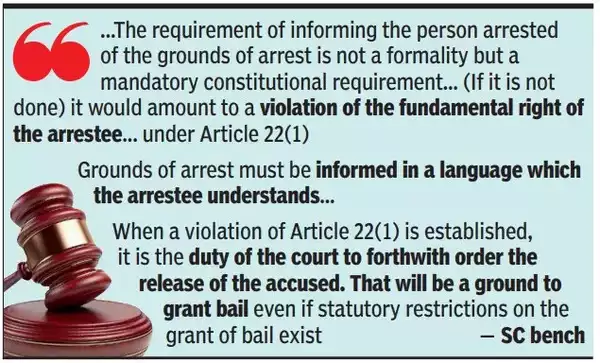NEW DELHI: Supreme Court has ruled that investigating agencies are duty-bound to inform grounds of arrest to the accused while taking them into custody and failure to comply with it would render the arrest illegal. It said the requirement to inform the grounds of arrest is not a “formality but a mandatory constitutional requirement”.
A bench of Justices Abhay S Oka and N K Singh quashed an arrest made by Gurgaon police, saying the accused had not been not informed of the grounds of his arrest. Though the court refrained from passing an order on the mode of communication of grounds of arrest, it said it would be better if it was communicated in writing as the burden would be on the police to prove that the grounds of arrest were communicated.
Court must release accused if right to liberty violated: SC
In a concurring but separate order, Justice Singh said the requirement of communicating the grounds of arrest in writing is not only to the arrested person, but also to friends, relatives or such other person as may be disclosed or nominated by the arrested person.. The court said the right to be informed about the grounds of arrest flows from Article 22(1) of the Constitution and any infringement of this fundamental right would vitiate the process of arrest and remand. It said a police officer cannot “casually” arrest a person in a cognisable offence, and that it could be done only when credible information was received.

The bench said, “Thus, the requirement of informing the person arrested of the grounds of arrest is not a formality but a mandatory constitutional requirement. Article 22 is included in Part III of the Constitution under the heading of Fundamental Rights. Thus, it is the fundamental right of every person arrested and detained in custody to be informed of the grounds of arrest as soon as possible.
“If the grounds of arrest are not informed as soon as may be after the arrest, it would amount to a violation of the fundamental right of the arrestee guaranteed under Article 22(1). It will also amount to depriving the arrestee of his liberty. The reason is that, as provided in Article 21, no person can be deprived of his liberty except in accordance with the procedure established by law.”
It further said, “The procedure established by law also includes what is provided in Article 22(1). Therefore, when a person is arrested without a warrant, and the grounds of arrest are not informed to him as soon as may be after the arrest, it will amount to a violation of his fundamental right guaranteed under Article 21 as well.”
The court said the grounds of arrest must be informed in a language which the arrestee understands and held that it is the duty of the courts to ascertain whether compliance with Article 22(1) and other mandatory safeguards has been made while remanding the accused.
“When a violation of Article 22(1) is established, it is the duty of the court to forthwith order the release of the accused. That will be a ground to grant bail even if statutory restrictions on the grant of bail exist. The statutory restrictions do not affect the power of the court to grant bail when the violation of Articles 21 and 22 of the Constitution is established,” it said.
